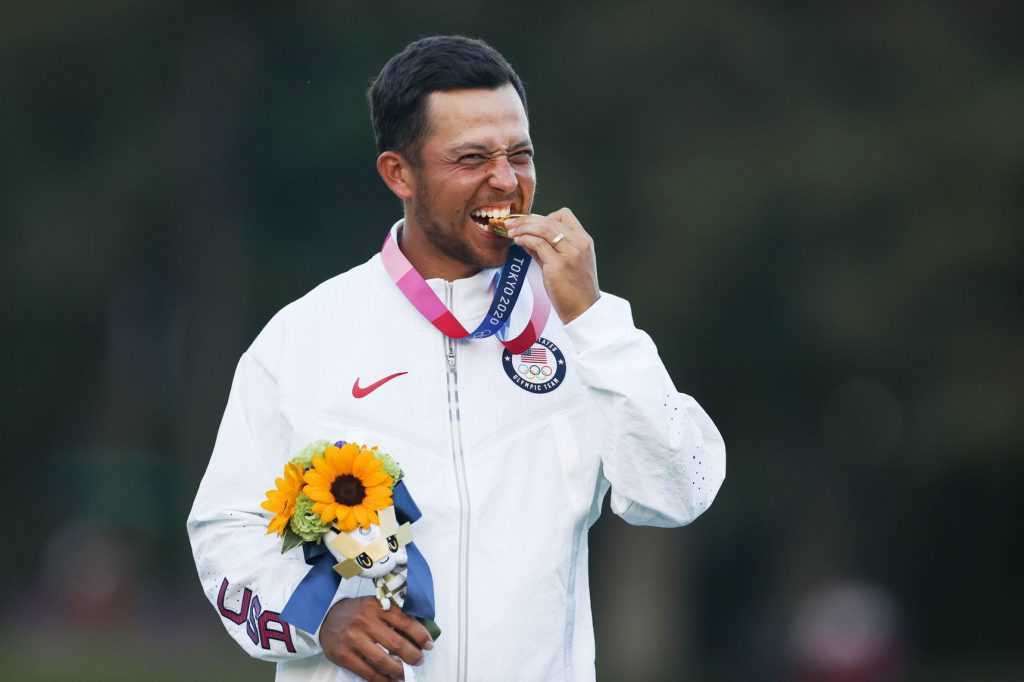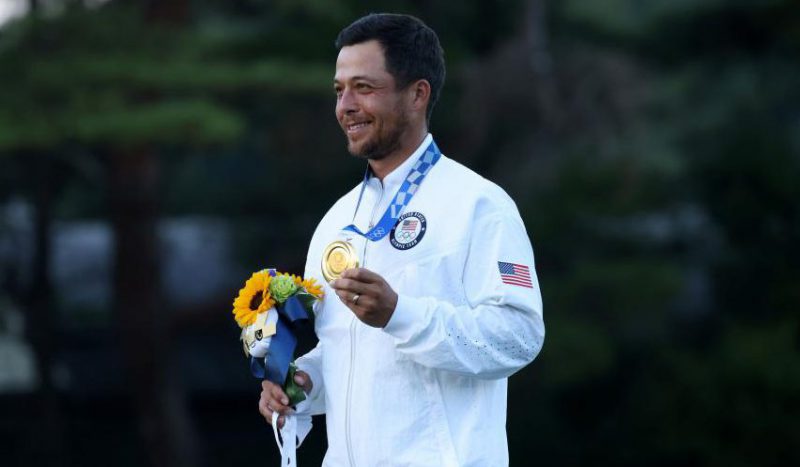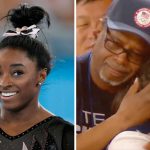Xander Schauffele wins the gold medal in golf.
Xander Schauffele of the United States won the gold medal in men’s golf at the Tokyo Olympics on Sunday, edging a crowded group of pursuers to win by a single stroke.
Schauffele came into the 18th hole with a one-shot lead over his closest rival but, after a poor tee shot, he was forced to lay up. He then landed a beautiful short-iron shot four feet from the cup. When he made his putt for par, the gold medal was his.
It was the first American gold medal in golf since 1904, a yawning gap explained by the sport being dropped after those Games and returning only in 2016.
Schauffele held off Rory Sabbatini, a South African playing for Slovakia, his wife’s native country, who blistered the course with a final round 10-under 61 that was good enough for the silver.
The battle for the bronze was an unusual seven-way playoff. Several major champions were in that group, including Rory McIlroy of Ireland, Hideki Matsuyama of Japan and Collin Morikawa of the United States.
Two players were knocked out with bogeys at the first playoff hole, and three more after Morikawa and C.T. Pan of Taiwan birdied the third.
It was the relatively unheralded Pan who won the bronze, though, with a par on the fourth playoff hole after Morikawa found the sand.
No previous major victory experience was necessary to win a gold medal at the Olympics. American Xander Schauffele proved it all weekend.
Schauffele, 27, has finished in the top 10 at all four majors in his young career (with top three finishes in every event but the PGA Championship). Now he’s the second men’s golfer alive with a gold medal, five years after Justin Rose of Great Britain won it in 2016 at the Rio Games, where the sport returned to the Olympic program for the first time in more than a century.
The sport’s inclusion was predicated on the fact the best players in the world would participate. While the 60-man field for these Tokyo Olympics became diluted due to positive COVID-19 tests from top-10 players Bryson DeChambeau (United States) and Jon Rahm (Spain), several notable names vied for a medal.
And Schauffele stood on top at the end with a 4-under 67 in Sunday’s final round to finish 18-under-par for the tournament.
Disaster nearly struck on hole 14 for Schauffele when his drive, so consistent all weekend, flew way right into shrubbery. Given a club-length of relief, he tangled with a skinny branch on his swing yet struck the ball well enough to eventually create a bogey opportunity, which he converted.
Three holes later, Schauffele found himself in more trouble, this time when his drive landed in a sand trap. But a cheeky approach set up a six-foot birdie putt and he sunk it to give himself the lead. A par save on 18, after yet another drive that missed the fairway, sealed the deal and the one-stroke victory over Slovakia’s Rory Sabbatini.
Sabbatini, born in South Africa, obtained Slovakian citizenship two years ago. The 45-year-old fired a tournament-low (and Olympic record) 61 on Sunday to win silver at 17-under.
CT Pan bested Collin Morikawa on the fourth hole of a seven-player playoff for bronze, depriving the U.S. of sending two of its four golfers to the medal stand.
Schauffele stormed to the lead Friday afternoon with a furious finish to sit 8-under after Round 2. And he never looked back.
He was the most consistent golfer for four days, entering Sunday with a 68, 63 and 68 on his scorecard.
Three birdies in the first five holes — two straight to start his final round — paved the way for him to play mostly par golf throughout the afternoon.
Crows cawed and cicadas sizzled all day as the sun scorched Kasumigaseki Country Club, about 75 minutes northwest of Tokyo. A large contingent of volunteers, media and officials trailed the final group, as Japan native Hideki Matsuyama played alongside Schauffele and Paul Casey (Great Britain) to provide the feel of a true final.
Even with the support, Matsuyama could not sink multiple birdie chances that would have put him on the medal stand. Instead, he and Casey – second and third, respectively, entering Sunday’s final round – exited after making bogey on 18 on the first hole of a seven-player playoff for bronze. The playoff moved to the par-3 10th hole, where all five remaining players made par and moved to 11.
Pereira had a fine look at birdie that did a 270-degree spin around the cup. Then McIlroy just missed his manageable birdie attempt that also lipped out.
Morikawa’s approach shot reached within a foot of the pin and he tapped his birdie in, as did Pan, who also had an attempt within three feet. Munoz bogeyed to join the elimination party, as Morikawa and Pan headed back to 18 for the fourth playoff hole.

What makes Xander Schauffele’s harrowing Olympic win such a golden moment
There is not much about the life of a tour pro that a layperson can relate to. Joe Average cannot hit a 200-yard 6-iron or nip a spinner off a tight lie. He has never flown on a private jet. He does not get recognized. The superstar life is, in most contexts, a hyper-specific experience.
And yet, underneath the wealth and fame lie normal people with normal human emotions—like wanting to make your pop’s dream come true. Of course, Xander Schauffele wanted to win an Olympic gold medal for himself. But he really, really wanted to win one for his dad, Stefan, whose own Olympic decathlon aspirations died when his car was struck by a drunk driver.
On Sunday, the younger Schauffele did what his dad never could: He won gold. And he did so in Japan, where his mother grew up and his grandparents still live. An up-and-down par from 98 yards on the final hole capped off a final-round 67, which was good for a one-shot victory over Rory Sabbatini of Slovakia—well, at least recently “of Slovakia”—who closed with a brilliant 61 hours before the leaders headed for the home stretch. C.T. Pan of Chinese Taipei took the bronze after winning a seven-man, four-hole playoff.
“It’s special,” Schauffele said. “That’s a word that’s thrown around a lot, especially for us golfers. I mean it’s so different for us, we’re used to playing for money and we play a normal schedule, and this is every four years and it’s just kind of a different feel to it. And you’re wearing your country’s colors and everyone’s just trying to represent to the best of their ability. So it does have that sort of special and different feel.
“To have my dad here as well is really special. I gave him a hug off the back of the green there. I know this means a lot to him, so I’m just happy to sort of deliver this.
This was quite a day for the tightly-knit Schauffele clan. Stefan is the only golf coach his 27-year-old son ever had. He is a ubiquitous presence at PGA Tour events, often wearing linen shirts and fashionable hats that would play quite well in the Hamptons. The Schauffele boys emanate a sense of California chill—Xander grew up near San Diego—and Xander needed every bit of that calmness on Sunday, when in an instant a stroll to glory morphed into a struggle for survival.
Schauffele began the day with a one-shot lead over local hero Hideki Matsuyama, seeking to cement himself in Japanese lore by adding a home gold to his green jacket. The American played the first five holes in three under and briefly led by as many as four shots before Sabbatini kept on pushing the tempo. He wasn’t the only one; nine of the 60 players in the field shot 65 or better, including a 63 from Collin Morikawa and a 65 from Justin Thomas. This was major championship pressure with John Deere scoring.
His cushion was down to one as Schauffele stepped to the last par 5 at Kasumigaseki Country Club, the reachable 14th. He fanned his first drive into a forest well right of the fairway. Provisional time. As one does, he over-compensated and badly hooked his re-load. Every golfer’s been there. Your first drive might be lost, and the provisional wasn’t much better. Just like that, a round-busting big number has entered the picture.
Xander Schauffele’s father/swing coach, Stefan, was an aspiring Olympian whose dreams ended after being hit by a drunk driver.
Schauffele owes a great deal to whoever found his original ball, for he wouldn’t have the gold medal around his neck if not for that person. With the ball located, Schauffele was able to take an unplayable lie, punch back into play, punch out again into the fairway, then get up-and-down for the best bogey of his life. Still, his lead had fully evaporated, and a swaggering Matsuyama was a single shot behind.
Ultimately, Matsuyama’s chances faded by way of body blows: a three-putt bogey at 15, missing a good birdie look at 16 and missing another at the drivable par-4 17th. After watching Matusyama’s birdie effort miss left on 17, Schauffele poured his right in the center to reclaim his lead for good over Sabbatini.
Schauffele wasn’t out of the woods yet, though, for his very next shot quite literally found the woods. Schauffele missed well right again on the par-4 18 and then inquired about a drop—he wanted line-of-sight relief from a scoreboard, but the scoreboard was directly behind a whole bunch of trees, so his inquiry was met with an “absolutely not.” (You can’t fault the man for thinking creatively.) Next came a punch out to the fairway, which meant he had to get up-and-down to avoid a playoff with Sabbatini. His third landed well past the pin but spun niftily back to three feet.
“I was trying so hard to just stay calm,” Schauffele said. “Hit a terrible drive on 18, had to make a sort of sloppy par and fortunately hit it close enough to sort of have a high percentage putt at roughly four, five feet. But, man, it was stressful. And I made that putt, and it was just a huge weight lifted off my shoulders and just very relieved and happy, of course.”
Ah yes, that weight. It’s there because Schauffele has steadily accumulated scar tissue from so many near-misses. His last victory on the PGA Tour came in January 2019, and he’s been candid about how frustrated he’s been at his inability to get the job done. Technically speaking, that victory drought persists, for this was not a PGA Tour event. It was much more than that. Closing the deal to win gold will have Xander Schauffele feeling like he’s ended his runner-up chapter—and Stefan Schauffele finally feeling Olympic glory, even if it’s vicarious in nature.
“I felt like I was out there playing,” Stefan told Golf Channel, holding back tears. “No, I’m not that good. You’re very proud. I think the real moment where the emotions come to the surface will be on the podium, when the anthem plays. Talking about this previously, I got choked up. I know that’s going to be a big moment. Very proud.”
Xander Schauffele With Clutch Putts Gives U.S. Gold in Golf
Four feet between his golf ball and the cup was all that separated Xander Schauffele from an Olympic gold medal, and he couldn’t help but let his mind wander.
For Schauffele, it would be as special as a major, the championships that have eluded him far too many times, most recently at the Masters. For his father, an Olympic medal to share after his own aspirations ended in a horrific car accident that cost him his left eye.
Xander Schauffele leaves Olympics with gold medal, but he almost never arrived in Japan
His grandfather, Richard, was the 1935 German track and field champion before being sidelined by a shoulder injury two weeks before the ’36 Olympics. His father, Stefan, was poised to qualify for the Olympics as a decathlete when he lost sight in his left eye after being struck by a drunk driver in 1986.
All of the work and the training and the effort that Xander Schauffele put into his craft was for this moment and yet he almost didn’t make the trip to Japan.
Like many players, Schauffele was reluctant to commit to playing the Olympic golf competition for a variety of reasons, including intense COVID-19 restrictions and awkward scheduling during a crucial point in the PGA Tour season. There were also logistics issues.
“I had to fight hard to get our hotel near here,” Stefan Schauffele said. “Honestly, if he had to stay in the village we were seriously contemplating not coming. They changed the alert level because of COVID-19 and the streets are empty, but if that wouldn’t have occurred you’d be sitting 2 ½ hours in a car one way and that’s just not how you can compete.”
There were also travel concerns for returning to the United States in a timely enough fashion to play next week’s WGC-FedEx St. Jude Invitational, but when the PGA Tour arranged for a charter flight from Japan to Memphis, it all made sense.
“Louis [Oosthuizen] talked to me at the U.S. Open and asked me about Japan and I told him I was trying to get a closer hotel and we’re trying to get a flight back and he just said, ‘I’m giving up.’ He withdrew,” Stefan Schauffele said. “I saw him in England at The Open and he said, ‘If I would have known there was a charter, I would have played.’”
Xander Schauffele’s decision to play, and all that effort, paid off with a gold medal-winning performance on Sunday at Kasumigaseki Country Club. After starting the day with a one-stroke lead, Schauffele extended his advantage to two shots with birdies at Nos. 1 and 2 and added another at No. 5 for a three-stroke advantage, before things intensified on the closing nine.
With Rory Sabbatini closing the gap with a tournament-record 61, Schauffele stumbled with a sloppy bogey at the par-5 14th after driving into the trees and taking a penalty drop to fall into a tie at 17 under.
He pulled ahead with a birdie at the penultimate hole, but was forced to lay up after a poor drive at the last that required some last-minute magic.
“I was trying so hard to just stay calm. Hit a terrible drive on 18, had to make a sort of sloppy par and fortunately hit it close enough to sort of have a high percentage putt at roughly 4, 5 feet. But, man, it was stressful,” he said. “I made that putt and it was just a huge weight lifted off my shoulders.”
It was a storybook ending for Schauffele, who had spent a lifetime hearing his father talk about the Olympics. Earlier in the week, he said he didn’t know how he would react coming down the stretch because Olympic golf is all so new. But following his closing 67 for a one-stroke victory, he acknowledged it was much better than he expected.
“It’s special. That’s a word that’s thrown around a lot, especially for us golfers,” Schauffele said. “I mean it’s so different for us, we’re used to playing for money and we play a normal schedule and this is every four years and it’s just kind of a different feel to it.
“You’re wearing your country’s colors and everyone’s just trying to represent to the best of their ability. It does have that sort of special and different feel.”
It was equally special for Stefan Schauffele, who said he’d remained largely indifferent to the outcome for most of the week but was bracing for an emotional podium ceremony and the national anthem.
“Nobody is going to play the anthem for you when you win the Masters; that level of pride just doesn’t exist in a major and lots of thoughts come back,” Stefan Schauffele said. “I’m choking up now just thinking about it. It’s just about honor.”
American Xander Schauffele Wins Olympic Golf, With Lessons from Japan and Germany
His win at Kasumigaseki Country Club solidified a distinctly American journey that traces its roots through Germany, San Diego and Japan.
KAWAGOE, Japan—Xander Schauffele is an American golfer with a German surname and grandparents in Tokyo. And now the strands of his unusual family history have merged into one career-defining moment: an Olympic gold medal in Japan.
Schauffele’s father and coach was once an Olympic hopeful until misfortune struck. His mother was raised in Japan. He won with his father at his side in the country where much of his family lives.
“I know my dad really wanted this one,” Schauffele said afterward.
“When I see him on the podium,” Stefan Schauffele said just off the 18th green, “I’m choking up thinking about it,”












